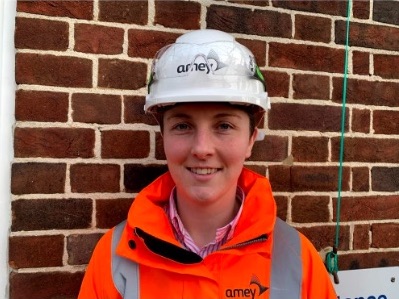
Analise Hopkins spent 6 years in the Royal Engineers between 2014-2020, finishing her service as a Sapper. Whilst at 39 Engineer Regiment as Combat Engineer andBricklayer, Analise’s tasks involved bridging,demolitions, watermanship and fortifications where she was truly committed as one of the first in and last out on large operations. The main task she completed was building accommodation: building roads, bridges, hesco walls and sangars. When she moved to 28 Engineer Regiment in 2019, Analise trained to be a CBRN Specialist (counter chemical, biological, radiological and nuclear).
Analise’s last role in the military was as OrderlyCorporal, completing admin work for the Squadron, directly under the OC, 2ic and the SSM. She also attended and presented lessons which were usually brush up lessons on combat engineering (demolitions, water supply, watermanship etc.) but mainly CBRN.
Key skills such as organisation, leadership and communication were gained during Analise’s service.These skills were a vital asset whilst on construction tours as Analise was the sole bricklayer, scoped up works and methods to liaise with the management team on how to complete given tasks and further utilised these skills in her role as Orderly Corporal.
Analise now works as a Project Manager at Amey Defence Services which she gained through BuildForce. During her transition, conversing with other veterans was her greatest ally settling into civvy street.
Analise’s biggest challenge was Covid-19 as she worried about jobs not being available as well as suddenly having to be constantly at home. During her transition, she would have liked better visibility of information on the military courses available.
As Project Manager, Analise works on upgrading military housing where her current project involves re-roofing 75 houses, removing chimneys and fireplaces. She oversees project progress and reports this back to the Area Manager. A typical day for Analise involves visiting sites, carrying out H&S inspections and ensuring work is completed to a high standard. She also has progress meetings with the Site Manager or client, liaises with residents, checking all paperwork in the site office is up to date and all permits are in date and signed.
Additional key skills gained during Analise’s six year service which she utilises daily are time management and IT, emphasising the significance of communication, as doing presentations and lessons in the military built her confidence when speaking to an audience.
Analise’s advice to someone leaving the Armed Forces and seeking a new career in construction is:
“Network! Try connecting with people on LinkedIn and start a conversation. Get on as many courses as possible with grants and funding provided before you leave; start doing them sooner rather than later, don’t just wait until the last few months of resettlement. Don’t undervalue yourself, aim high!”
Finally, Analise describes a career in the construction industry as: “Challenging. Exciting. Educational”.